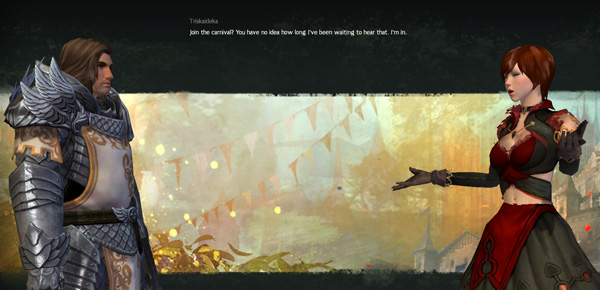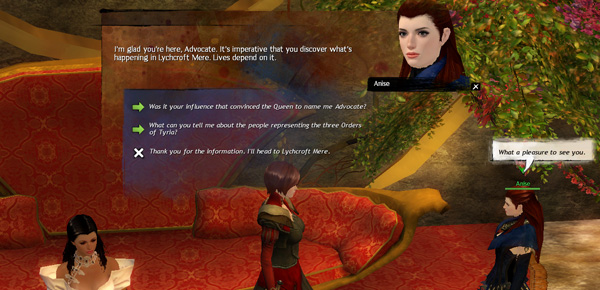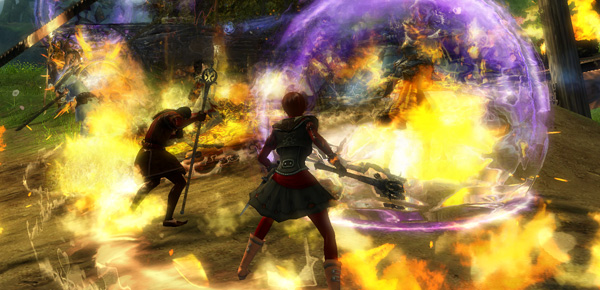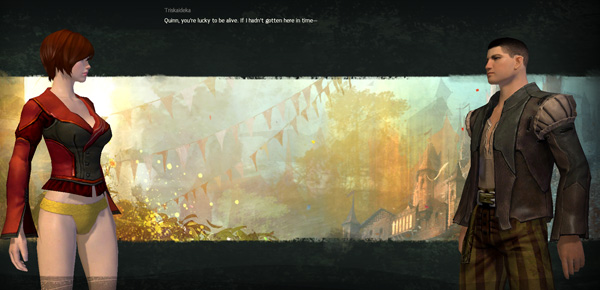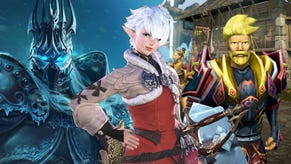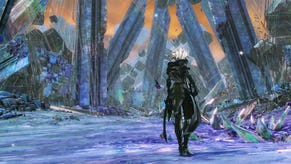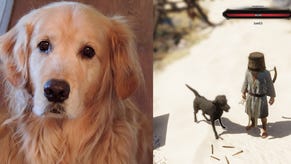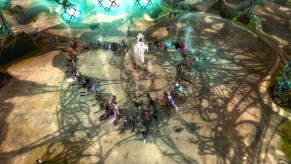Guild Wars 2: MMO Vs. Story, Round 7
Narrative XPdiency
Guild Wars 2 isn't the first MMO that's tried to tell a single-player story. For that specific element, it's not even the highest profile one in recent months - both The Old Republic and The Secret World going all out to make narrative matter. The stories it tells, while definitely fun, aren't as interesting or memorable, or even as notable a presence during most of my travels.
So why do I feel much more involved with my Elementalist's personal journey through the world than with either of the games that set out to make narrative their main selling point?
For me at least, there are several reasons the personal story works so well - starting with how much effort ArenaNet put into scripting unique encounters instead of simply writing lots of dialogue, and heading all the way down to the fact that it essentially gives you the chance to tell the game exactly what kind of story you want it to tell. With any race, you get six obvious "This Will Be A Thing You Will Do Later" choices to make, and with them, six chances for the game to get you at least slightly invested in the personal stuff before it even starts.
The killer difference though? Pacing. In more ways than one.
The way Guild Wars 2 does its story is to dole out a new chapter every few levels. You spend most of the time doing your own thing, occasionally being called to a specific location to do a more scripted bit. You don't have to. Like everything in the game, you can skip it if you want and go do PvP instead, or simply come back later on and catch up at your leisure.
It's those gaps that make all the difference. Both The Secret World and The Old Republic are so driven by dialogue that they have to keep the pressure up at essentially all times. You're always in dialogue. You're always being given stuff to do. You're always meeting new characters and always getting involved in small stories. Even done well, it gets incredibly repetitive - and both those games have some nightmare pacing issues. The Old Republic goes out of its way to waste your time, while The Secret World's problems start right about the time you see your first assignment is 18 freaking parts long and spread out over three huge maps.
In short, while both tell good stories, the way they do it is a recipe for quick burnout - lots and lots of small things in sequence, presented in pretty much the same style as the important stuff, which you're encouraged to rush through in bulk to the point that everything soon melds together into a general lump of narrative that soon loses all meaning. Factor in the rest of the genre's standard features and everything soon collapses. There can be no danger, because you know the game doesn't have the balls to do anything to you beyond make you walk back from a respawn point. You know and have it constantly reinforced that your actions have no real meaning beyond making a little bar move a little further to the right. With good writing, this can be made enjoyable, but rarely feels anything other than hollow in the long term.
The more you play, the more this becomes noticeable - especially when the main practical difference between the handful of personal quests that supposedly matter and the vast bulk you're just doing for virtual brownie points is that some guy tells you they're more important. How do single-player games handle this? They don't have to. Even something like Skyrim isn't built with the idea that it has to provide months and months of content to every player, so the focus gets to be telling a good story and packing it with side-quests that add flavour and intrigue rather than simply another ten minutes of hitting things in the face and taking their gold.
By spreading these moments out, and handling them in a completely different way to the normal questing and NPC interactions, Guild Wars 2 accomplishes several important things. First, it keeps these specific missions something of a novelty, and a welcome dose of structure in an otherwise incredibly freeform MMO. On the story side specifically, it also gets to focus heavily on the things it wants you to know and reinforce them. Picking the Human side, you're not going to get to Level 20 and not know who Logan Thackeray is. Key words like "Destiny's Edge" will at least be on their way to being embedded in your skull, and made more prominent by being voiced and delivered in cutscene form instead of simply buried in flavour text.
As straight fantasy, nothing I've seen has been that special, and certainly not up to the quality of The Secret World's acid-tipped pen. It's effective though, with the focus and pacing tricks it pulls off more than enough to make seemingly trivial stuff like investigating a carnival seem important simply because someone as high profile as Logan is taking a personal interest.
(On a smaller scale, the story - at least of the Human faction - is pleasingly driven by interpersonal connections rather than pure authority. You're not sent into the field by your boss, but by friends your actions have earned you. It trends warm, while both TOR and TSW typically leaned cold. That's not necessarily better, but is a heck of a lot more welcoming.)
Despite this, I certainly wouldn't call Guild Wars 2 is a story slam-dunk. It does a brave job of going beyond regular MMO conventions with things like dialogue trees, tracking your response types, offering branch points and keeping the great unwashed out of your heroic story. It's still hobbled by its engine/interaction methods though, the fiction itself is serviceably entertaining rather than awesome, and the MMO elements do still get in the way - especially when an encounter doesn't seem to have been tuned for an Elementalist to get into a fight instead of a Warrior, or a character tells you to hurry up and save the day only for you to have to reply "Okay, but first I'll need to run across the world and get some XP from the kitties!"
And conversations after taking too much armour damage can really be awkward...
I don't necessarily think this is a great approach for MMOs to take - I still maintain that while story/setting is vital, I'd always prefer games like The Secret World or The Old Republic to be single-player experiences that wouldn't have to sacrifice their narrative and immersion for the sake of another genre's needs. In turn, I'd much rather see see multiplayer games focus on cool things only they can do rather than trying to be jacks of all trades.
If the worlds of massively multiplayer action and single-player driven storytelling must be rudely smushed together like a pie and a sleazy politician's face though, this is - at least so far - the best implementation I've seen. It's not that it's more ambitious than The Old Republic or better written than The Secret World. It's simply that unlike those games, I can take it for what it is, and on its own terms, as a part of the experience that neither wastes my time nor constantly makes me wish it was something it isn't. That might sound like the faintest of faint praise, but by this genre's narrative standards, it's actually pretty damn good going...


